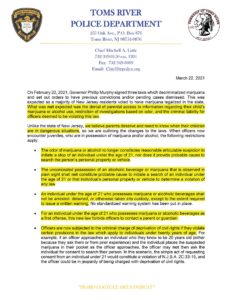

We stand with all law enforcement and parents to protect our youth and the officers who truly want the best for them!
The new law goes far beyond the simple legalization of marijuana. It indirectly decriminalizes marijuana use for our youth and ties the hands of law enforcement and their ability to do their job.
Thank you for your continued support!
March 22, 2021
On February 22, 2021, Governor Phillip Murphy signed three laws which decriminalized marijuana and set out orders to have previous convictions and/or pending cases dismissed. This was expected as a majority of New Jersey residents voted to have marijuana legalized in the state. What was not expected was the denial of parental access to information regarding their child’s marijuana or alcohol use, restriction of investigations based on odor, and the criminal liability for officers deemed to be violating this law.
Unlike the state of New Jersey, we believe parents deserve and need to know when their children are in dangerous situations, so we are outlining the changes to the laws. When officers now encounter juveniles, who are in possession of marijuana and/or alcohol, the following restrictions apply:
• The odor of marijuana or alcohol no longer constitutes reasonable articulable suspicion to initiate a stop of an individual under the age of 21, nor does it provide probable cause to search the person’s personal property or vehicle.
• The unconcealed possession of an alcoholic beverage or marijuana that is observed in plain sight shall not constitute probable cause to initiate a search of an individual under the age of 21 or that individual’s personal property or vehicle to determine a violation of any law.
• An individual under the age of 21 who possesses marijuana or alcoholic beverages shall not be arrested, detained, or otherwise taken into custody, except to the extent required to issue a written warning. No standardized warning system has been put in place.
• For an individual under the age of 21 who possesses marijuana or alcoholic beverages as a first offense, this new law forbids officers to contact a parent or guardian.
• Officers are now subjected to the criminal charge of deprivation of civil rights if they violate certain provisions in the law which apply to individuals under twenty years of age. For example, if an officer approaches an individual who they know to be 20 years old (either because they ask them or from prior experience) and the individual places the suspected marijuana in their pocket as the officer approaches, the officer may not then ask the individual for consent to search their person. In this scenario, the simple act of requesting consent from an individual under 21 would constitute a violation of N.J.S.A. 2C:33-15, and the officer could be in jeopardy of being charged with deprivation of civil rights.
Reviewing the new policy, what presents itself as most problematic is the inability to freely communicate with parents. Police departments throughout the county have always sought the implementation of non-punitive measures for the majority of juvenile offenses including underage alcohol or marijuana possession or consumption. Formal charges have always been a last resort.
We see these laws as not only counterproductive but also as a detriment to the safety of our children. To apply this to a real-life situation, if an officer sees a 12-year-old (or a juvenile of any age) consuming alcohol or smoking marijuana, we CANNOT contact the juvenile’s parent/guardian unless this behavior has been previously documented. In the event officers do approach based on odor or plain sight, they will be the ones facing charges NOT the juveniles. This law undermines departmental efforts to communicate with our parents, school districts, and communities to protect our children collaboratively. We are shocked and appalled by this new law. Who will ensure the welfare our children, if the police can neither act nor contact a parent or legal guardian?
The greatest strengths we had as law enforcement officers was our ability to foster positive relationships and build trust within the communities we serve. We accomplished that by immersing ourselves into our communities and dedicating our entire careers building that trust. With one signature on this poorly written law, we all will watch this public trust deteriorate, as well as the quality of life in our communities.
Although Trenton has leaked word that a “clean-up” bill will be passed allowing officers to provide notification to parents when children are caught using or possessing marijuana or alcohol, do not be lured into a false sense of security. This cleanup language as proposed does nothing to correct this fatally flawed legislation. Officers would continue to face the potential of serious criminal deprivation of civil rights charges for the common-sense act of simply investigating the underage use or possession of marijuana or alcohol by minors. What is the sense of allowing parental notification, when they leave language in the law that still prevents us from starting an investigation in the first place?
Please Don’t Allow Trenton to Handcuff Your Family. As outlined above, this law in its present form essentially “legalizes” marijuana and alcohol use for minors. This legislation turns our kids into innocent collateral damage in the quest for social justice in New Jersey.
It is wrong. It is indefensible. It must be fixed!
Chief Mitchell A. Little
Chief of Police

